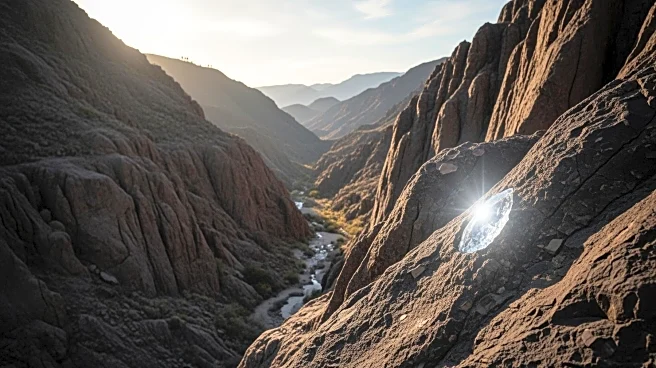What's Happening?
Trigg Minerals, an Australian company, has proposed a mining project in Antimony Canyon, Garfield County, Utah, aiming to extract antimony, a critical mineral used in various defense and technology applications. The canyon, located behind the home of
Ole and Kenda Lindgren, is believed to contain one of the largest antimony deposits in the United States. The company plans to begin exploratory drilling by the end of the year, with full-scale operations potentially starting in 2027. While Trigg Minerals asserts that operations will comply with environmental regulations, the proposal has divided the small community of Antimony, which has a population of just over 100 people. Some residents, like the Lindgrens, are concerned about the impact on local water supplies, wildlife, and their way of life. Others, including Ellen and Roger Gleave, see potential economic benefits, such as job creation and revitalization of the town.
Why It's Important?
The proposed mining project in Antimony Canyon highlights the ongoing national debate over resource independence versus environmental protection. Antimony is crucial for national defense and clean-energy technologies, yet the U.S. relies heavily on imports from countries like China. Domestic production is considered a strategic priority by the U.S. Geological Survey. The project could enhance U.S. self-reliance in critical minerals, potentially reducing dependency on foreign sources. However, it also raises concerns about environmental degradation and the disruption of local communities. The outcome of this project could set a precedent for how similar initiatives are approached in the future, balancing economic growth with ecological and social considerations.
What's Next?
Trigg Minerals plans to start exploratory drilling by the end of the year, with full-scale operations anticipated in 2027. The community of Antimony is actively engaged in discussions, weighing the potential benefits against the risks. Local residents, including the Lindgrens, are seeking to halt the project before permits are granted, emphasizing the need to protect their environment and lifestyle. The town's mayor, Kasey King, acknowledges the need for more jobs but stresses that more information is needed before making a decision. The project will likely continue to be a focal point for community meetings and discussions, as stakeholders evaluate the implications for both local and national interests.
Beyond the Headlines
The Antimony Canyon mining project underscores broader ethical and cultural dimensions, such as the impact of industrial activities on rural communities and the preservation of natural landscapes. It raises questions about the rights of local residents versus national interests in resource extraction. The project also reflects a growing trend in the U.S. to prioritize domestic production of critical minerals, which could lead to long-term shifts in economic and environmental policies. As the community navigates these challenges, the situation in Antimony could serve as a microcosm for similar debates across the country.














